Co-Parenting a Child with Food Allergies
3 tips to help take the stress out of co-parenting a child with food allergies.
- 3 min read
- health & wellness

Co-parenting a child with food allergies or special dietary needs can be a challenge. For many parents, monitoring what your kids are eating when they’re in your custody is stressful enough, but trusting your co-parent to do the same adds a whole new layer of worry. If this sounds like you, try these 3 tips to take some of the stress out of co-parenting a child with food allergies:

1. Document
Life as a parent is busy and co-parenting is no exception. It can be extremely beneficial to document your child’s food allergies or special dietary needs in a place that both parents can easily access.
This documentation should include all information related to the food allergy or special diet, including foods that are off-limits, moderated, or required. It’s also a good idea to include instructions or details regarding what either parent should do if the child does not follow the restrictions or guidelines.
TalkingParents makes it easy to document information like this. Our Info Library feature is the perfect place to store details related to allergies, dietary restrictions, and/or dietary needs. You can create a shared card for both parents to access and then categorize the information with tabs. You and your co-parent can also see when an Info Library card was last edited, making it easy to tell whether the information is up-to-date.

2. Educate
Both parents need to be fully informed of the child’s food allergy or special diet, as well as any changes or updates that may take place. Documentation should help co-parents keep tabs on details like this.
When your child is old enough, it’s equally important for them to be informed of the allergy or diet. Educating your kids about healthy choices and eating habits is a great place to start. From there, take time to fully explain your child’s allergy to them, including what could happen if they eat or drink something they’re allergic to.
Making sure your child is aware of their allergy is smart no matter what the parenting situation might be. This knowledge will help keep your child protected and on track when they are not in either parent’s care, such as at school or at a friend’s house. You, your co-parent, and your child should also educate yourselves on the signs and symptoms of an allergic reaction, including but not limited to:
- Wheezing
- Trouble breathing
- Coughing
- Hoarseness
- Throat tightness
- Belly pain
- Vomiting
- Diarrhea
- Itchy, watery, or swollen eyes
- Hives
- Red spots
- Swelling
- A drop in blood pressure, causing lightheadedness or loss of consciousness (passing out)

3. Communicate
If you notice any changes in your child’s allergy, good or bad, you should communicate with your co-parent and pediatrician immediately. Even small changes should be thoroughly examined and documented.
Additionally, if your child does have an allergic reaction while in your care, it’s important to notify your co-parent and pediatrician. Even if the situation is resolved quickly, everyone should be informed in case of any lingering effects or fallout.
TalkingParents is a safe and secure way for co-parents to exchange information like this. Features like Secure Messaging and Accountable Calling℠ allow you and your co-parent to quickly communicate about emergency situations, while keeping everything on the record.
Co-parents need to present a united front
When it comes to matters involving your child’s health and wellness, remember, you’re in this together. Putting your child’s needs first is the most important thing, and it’s crucial for them to see that you’re both on the same page about health conditions like a serious food allergy.